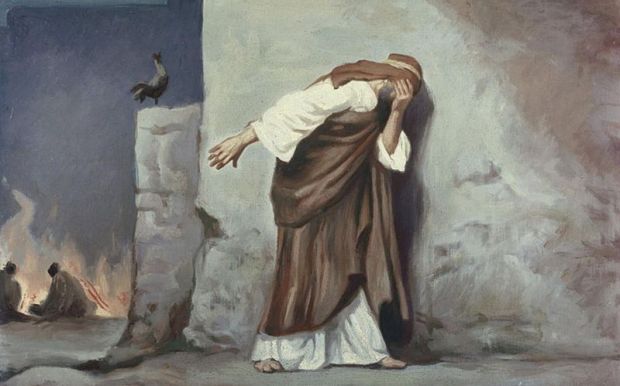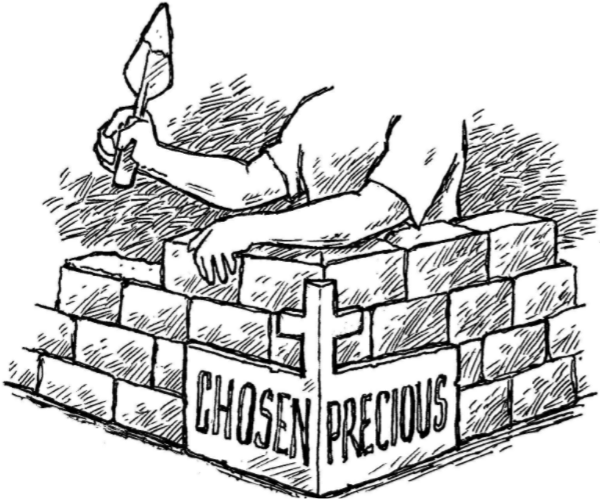Readings: Jeremiah 23:1–6 | Ephesians 2:11–22 | Mark 6:30–44
Text: Ephesians 2:11-22
Tick, tick, tick, tick goes the rollercoaster as it climbs its way to the sky. For a moment, there’s the feeling of exhilaration and weightlessness at the top. But you know that in just a split second, you will be hurtling down—maybe even lower than where you started!

In chapter 1 of Ephesians, we were privileged to receive a glimpse into the heavenly counsel. From the heights of the highest heaven, we heard, “[The Father] chose us in [His Son] before the foundation of the world, that we should be holy and blameless before him. In love 5 he predestined us for adoption to himself as sons through Jesus Christ” (Eph. 1:4) But like the Transfiguration, none of us is able to stay for long without being yanked back into our present reality. Chapter 2 gives such a whiplash to the depths of each person’s earth-born condition: “And you were dead in the trespasses and sins 2 in which you once walked, following the course of this world, following the prince of the power of the air, the spirit that is now at work in the sons of disobedience— 3 among whom we all once lived in the passions of our flesh, carrying out the desires of the body and the mind, and were by nature children of wrath, like the rest of mankind.”
It would be no wonder if you screamed at such a drop! But God does not leave us in the depths of our depravity. Two words signal us being lifted up out of grave: “But God,” as in, “But God, being rich in mercy, because of the great love with which he loved us, 5 even when we were dead in our trespasses, made us alive together with Christ—by grace you have been saved— 6 and raised us up with him and seated us with him in the heavenly places in Christ Jesus” (Eph. 2:4-6)
All of this is apparent from a heavenly perspective, and made known to us by the Holy Spirit speaking in the Word. It isn’t clear from our experience. When we go out from this place, we live in the same world as the “rest of mankind,” suffering all the same troubles and mortality.

God’s action to raise sinful people up from the depths of spiritual death also has another effect: Reconciliation and reunion among all who call upon the Name of the Lord:
(From today’s reading): 12 Remember that you were at that time separated from Christ, alienated from the commonwealth of Israel and strangers to the covenants of promise, having no hope and without God in the world. 13 But now in Christ Jesus you who once were far off have been brought near by the blood of Christ.
Not only was there a drop into the grave, but in sin, we are also separated, far off, alienated, even from God in the world. And this is what our experience is: Blinded by sin, people find reasons to separate from one another. Whether it’s divisions of class, skin color, or nationality, mankind has shown itself to be an expert at xenophobia, or even xenocide (killing the alien). But, in fact, the root of it all is that we were strangers from God (the root xeno means alien or stranger). Without God, we were without hope because we could only look to this broken mess of a world for salvation.
Yet, just as God reached down into the grave to raise us up, He also reached out to us who were far away and alienated from Him to bring us near by the blood of Jesus Christ.

14 For he himself is our peace, who has made us both one and has broken down in his flesh the dividing wall of hostility 15 by abolishing the law of commandments expressed in ordinances, that he might create in himself one new man in place of the two, so making peace, 16 and might reconcile us both to God in one body through the cross, thereby killing the hostility.
And this division was expressed in the peculiarity of God’s people Israel. God Himself was the One who set them apart, distinguished by the commandments and ordinances given through Moses. They were set apart from all the other nations, not to intermix and keenly aware of the foreignness of the rest of the human race.
All of this, however, was an illustration of the divide between a holy God and the corrupt human race. Our alienation from God resulted in enmity with each other, but God put an end to this with His own kind of violence. Notice the words used here: “He has broken down in His flesh the dividing wall of hostility, by abolishing the law of commandments”…”killing the hostility.” It was by the violence of sin and rebellion against God that He worked peace with His rebellious human creatures. God broke down the dividing wall of enmity by fulfilling the promise made against Satan on behalf of our parents, “I will put enmity between you and the woman, and between her Offspring and your offspring.” (Genesis 3:15) The Lord abolished the condemnation of the Law by putting Himself under its judgment on our behalf: “For our sake he made him to be sin who knew no sin” (2 Cor. 5:21). By being killed under the judgment of a sinner, He destroyed that enmity for us who in fact deserve the title, “sons of disobedience” (Eph. 2:2).

In the wake of God’s violence (His Son nailed to the cross), alienation (“My God, my God, why have you forsaken Me?” Matt. 27:46), and killing the hostility (“It is finished” John 19:30), the rollercoaster ride is finished because heaven and earth are united, Jews and Gentiles are part of one redeemed human family. The Church’s one foundation is Jesus Christ her Lord. (LSB 644, st. 1)
Now this passage also addresses a concern some have about a topic called “Replacement Theology,” which says that the Christian Church has replaced Israel in God’s plan, so that after Pentecost, anything referring to Israel is allegorized and actually refers to the New Testament Church. Lutherans are accused of subscribing to this.
But what Lutherans actually subscribe to is what Scripture teaches, and it’s clear from Paul’s explanation that while Israel may have come first in time, the Gentiles who were far off were brought in and made part of God’s holy people. It’s too simple to say that the Church replaced Israel, as if God didn’t really mean it when He spoke of an everlasting covenant. Rather, in calling non-Jews by faith, God was fulfilling the promise of the covenant He made with Abraham, “in you all the families of the earth shall be blessed.” (Gen. 12:3) Israel is also called Abraham’s offspring, and Paul makes it very clear—when false teachers were confusing covenants—“27 For as many of you as were baptized into Christ have put on Christ. 28 There is neither Jew nor Greek, there is neither slave nor free, there is no male and female, for you are all one in Christ Jesus. 29 And if you are Christ’s, then you are Abraham’s offspring, heirs according to promise.” (Gal. 3:27-29) God gave the commandments to show His holy will for humanity, but that by itself saves no one; Israel of all people showed just how much the Law couldn’t justify much less fix our sinful condition. They showed how much they needed the Christ to be the Lamb of God! They, along with all the families of the earth, are blessed because God has united His original covenant people in the covenant-now-fulfilled in Christ, and people of every nation through the new covenant in the blood of Jesus.

For all who benefit from the covenant in Jesus’ blood, the blessings prove true, so that we can rejoice as the “daughter of Zion” (Matt. 21:5) and citizens of the “Jerusalem from above” (Gal. 4:26). God has always wanted, and still desires the descendants of Israel to repent of their idolatry and see the Messiah He has sent, but He won’t save them apart from the Way, the Truth, and the Life [Jn. 14:6]—who is Jesus Christ. So Paul continues,
17 And he came and preached peace to you who were far off and peace to those who were near. 18 For through him we both have access in one Spirit to the Father. 19 So then you are no longer strangers and aliens, but you are fellow citizens with the saints and members of the household of God.
This is the true reality for the Church: Peace with God, united together as fellow citizen with the saints and members of God’s household. God preaches peace to us, and assures us of this truth.
While that rollercoaster ride is finished, our experience preaches another story. For each of us, we struggled against the passions of our flesh which rear their ugly head in addiction, enmity, fits of anger, sexual sins, dissension, and rebellion against authority (to name a few). Sometimes we are able to restrain our flesh, and other times we utterly fail.

The experience of the Christian Church on earth is similarly fraught with failure. As one of four churches in town who bear the name Lutheran, it’s pretty clear how much we fail to live in that unity for which our Lord prays in John 17:11: “Holy Father, keep them in your name, which you have given me, that they may be one, even as we are one.”
If the future of our faith and the future of the Christian Church in the world depended on us, we would all be doomed. But it is forever God who, out of His great love, saves us from destruction. “Though with a scornful wonder, the world sees her oppressed/ By schism rent asunder, by heresy distressed/ Yet, saints their watch are keeping/ Their cry goes up, ‘How long?’” The saints, and fellow members of the household of God rely on God’s faithful work. His Church is:
20 built on the foundation of the apostles and prophets, Christ Jesus himself being the cornerstone, 21 in whom the whole structure, being joined together, grows into a holy temple in the Lord. 22 In him you also are being built together into a dwelling place for God by the Spirit.
We can take comfort in God’s work alone. It’s Him who pulled us up out from spiritual death and on the road to hell. By grace we are saved through faith…”and this is not your own doing; it is the gift of God.” (Eph. 2:9) Why should we think that once He’s brought us near, that He’s going to leave it up to you to stay? He has made you alive in Christ so that you know the heavenly perspective, the eternal view, and most of all that He brought you near and made peace by the blood of Christ. You are baptized into Him. Your sins are forgiven. You have peace with God. We have peace with God, and union with all the saints in Christ who believe this blessed Gospel. This is what God is bringing to pass, but will only be seen on the Last Day. Until then, we hope in God, who alone is able to achieve this. Remember, that it is only He who is able to bring people out of unbelief, up from the grave, and set them in the heavenly places to praise Him for eternity. All glory and thanks be to God forever! Amen.



